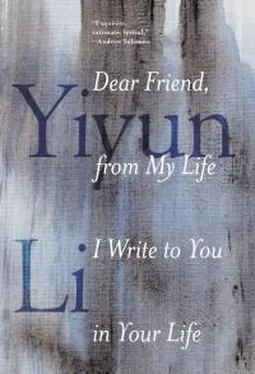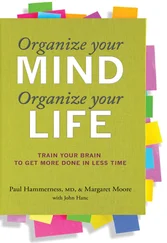Once my grandfather, taking a walk along Garden Road, felt unwell and was helped by a young soldier. He became part of the family, an adopted grandson who visited on weekends. After my grandfather’s death, he traveled to Beijing with his new bride and stayed with us. My sister and I adored his bride, who was pretty and mild-mannered. The day before their departure, he had to stay overnight in a queue for train tickets, and I caught her crying in the morning when he had not returned. He was only delayed, and they went home happily married. After they left I found a writing pad, the top page ripped away, though I could see the trace of what had been written: an anxious monologue of the bride’s, asking herself what his absence meant, why she was left in this vacancy, and how the marriage had come into being in the first place. Years later I underlined in a Bowen novel a passage about a character’s “emphatic” pencil, which had left a trace for her daughter to decipher.
—
WHAT’S THIS ABOUT? my older son asked me when I was watching on the Internet a military parade in Beijing. A celebration of the end of World War II seventy years ago, I said. My great-grandfather died in that war, I said, and immediately regretted sounding like the cabdrivers easily offering inherited family dramas. Which year was that? my son asked. Nineteen thirty-eight, I said. That was the end of the discussion. I did not want to describe the man’s death as it had been described to me. He, a fabric merchant in a small town, was forced into hard labor for the Japanese army; he had a limp that made him unable to keep up with the other laborers, and was killed summarily, his torso cut open by a sword. (Having not met the man and not witnessed his death, I had spent much time thinking about him when I was young. His limp reminded me of my limping cousin.)
I don’t understand why Trevor still writes about the Troubles, someone in Ireland once said to me. They are old stories, and Ireland has moved on. I can tell you your books have hurt my feelings, a reader, who turned out to have grown up in the same apartment compound I did, announced at a bookstore reading; why do you have to write about China’s history; why can’t you make me feel proud of being Chinese? But cruelty and kindness are not old stories, and never will be.
In elementary school, a girl’s father died suddenly. The next morning, on cleaning duty, I swept my side of the schoolyard and watched her sweep the other side. (It did not occur to me to question why cleaning duty was more important than a father’s death or why I did not offer to help her.) She was weeping, her tears falling into a pile of leaves. I wanted to say something to her but did not know what, all the time plagued by a glum concern. She was the other plump girl in my grade; even the meanest boys would leave her alone now, and I would be the only plump girl to be made fun of. I did not recognize the frivolousness of my worry. Though I remember my subsequent thought while watching her: at least she had a reason to cry, and people would understand.
Did I tell you Teacher Sun died? my mother asked me recently. Nobody is going to miss him, she said; bedbound for ten years and nobody felt bad for him then, either. There was no malice in her words. The dead man, my fifth-grade math teacher, had once been known to beat boys in class and put his hands the wrong way on girls’ bodies. No parents or teachers or school officials ever intervened. He was a violent man, capable of doing anything to anyone who offended him. One less evil person in the world, my mother said. Her words reminded me of something I had nearly succeeded in forgetting. This teacher used to write problems on the board at the beginning of class and ask me to solve them while he walked between aisles, taking his time to pick out ears to wring. When I finished the problems, having already inflicted pain on a boy or two he would return to the board. Beautiful, he would remark. Despite his cigarette-stained fingers and the sour breath of a smoker behind his sadistic smile, I did not feel repulsed by his approval. Then he would turn and launch a piece of chalk at someone—we all knew it would happen. You, the teacher would say, yes, I’m talking to you, he would stare at the boy marked by the chalk; you’ll never understand the beauty of a mind. With those words I was dismissed and sent back to my seat.
Cruelty and kindness, revisited, are not what they appear to be.
When I visited my parents this past summer, in the same apartment I grew up in, I saw a photo of me, taken on my fifth birthday, next to a photo of my mother, taken when she was sixteen. There were other photos of the family, though those two, older than the rest by decades, their subjects captured at a much younger moment, were prominently displayed. I flinched at this shrine of innocence, when neither girl in the pictures had yet caused much damage. My mother had a dreamy laugh, beautiful in a romantic and glamorous way; I was smiling as ordered by the photographer, not precociously but dutifully. What if I had not known either of them? I would have looked at them more closely, my curiosity not different from my curiosity about any stranger. No better and no worse than others, these two are fools of fortune, too.
“You may be less confused than you imagined,” in a letter Trevor wrote. “Stories are a hope, and often they obligingly answer questions.”
—
WHO ARE YOU? Trevor asked when I saw him this past spring. It’s okay, I said; I’m only coming to see you. Ah, we met in Boston, he said a minute later. Yes, we met in Boston, I said, but I could have also said: we are solitary travelers, having crossed paths in the land of stories.
Afterword
On Being a Flat Character, and Inventing Alternatives
There are many ways to answer the question. Not everyone would ask, but some would if true curiosity—a genuine desire to understand—were allowed in place of good manners. I would, too. In fact, I still do ask myself: What made you think suicide was an appropriate, even the only, option?
Various hypotheses have been offered by this or that person at this or that moment: genes, lack of mental strength or maturity, selfishness, cell signals gone randomly awry. There are more practical explanations too. I was once ambitious—or greedy—enough to want to excel at being a mother and a writer while holding a full-time job. For almost ten years I wrote between midnight and four o’clock in the morning.
Would I have deprived myself of such a basic necessity had I known it would leave such damage? I think so. I do not see another way to manage what I wanted to do. In her notes on writing novels, Elizabeth Bowen emphasized alternatives:
It’s the palpable presence of the alternatives that gives action interest. Therefore, in each of the characters, while he or she is acting, the play and pull of alternatives must be felt….By the end of a novel the character’s alternatives, many at the beginning, have been reduced to none….The “flat” character has no alternatives.
—
I WOULD LIKE to believe that there are as many alternatives in life as in fiction; that roads not taken, having once been weighed as options, define one as much as the irreversible direction of the chosen path. What would have become of you had you not left China? asks a friend; what would have become of you had you not landed in Iowa City, or had you stayed a scientist? What I can offer are not alternatives, only negatives. I would not have chosen English as my natural language; I would not have known one can go to school for writing; I would not have become a writer.
But what would have become of me? When this friend asks a similar question about a character—how would her life have turned out had she not emigrated?—I have no trouble seeing her in Beijing: the overpass she crosses every day to get to her bus stop; the crippled beggars she, having at last mastered the art of not looking, no longer gives money; the cabdriver she halfheartedly engages in conversation when he, like all cabdrivers in Beijing, takes pleasure in mocking the government; the many keys on her key ring—one unlocking the wooden box next to her apartment door, in which is the daily delivery of fresh milk for her child (her child would not grow up knowing the joy of walking to the milk station every evening); another one for the mailbox (years ago all mail for the building was crammed into the same green box, an enticement because she always liked to see who were the lucky ones to receive letters); keys for the apartment and the office and the car and the security gates—keys, too many, representing privileges and responsibilities. In my Chinese life I had only one memorable key—the kind that could be found in any antique store in America—bronze, the length of my entire palm, which I carried around my neck on blue nylon twine.
Читать дальше












